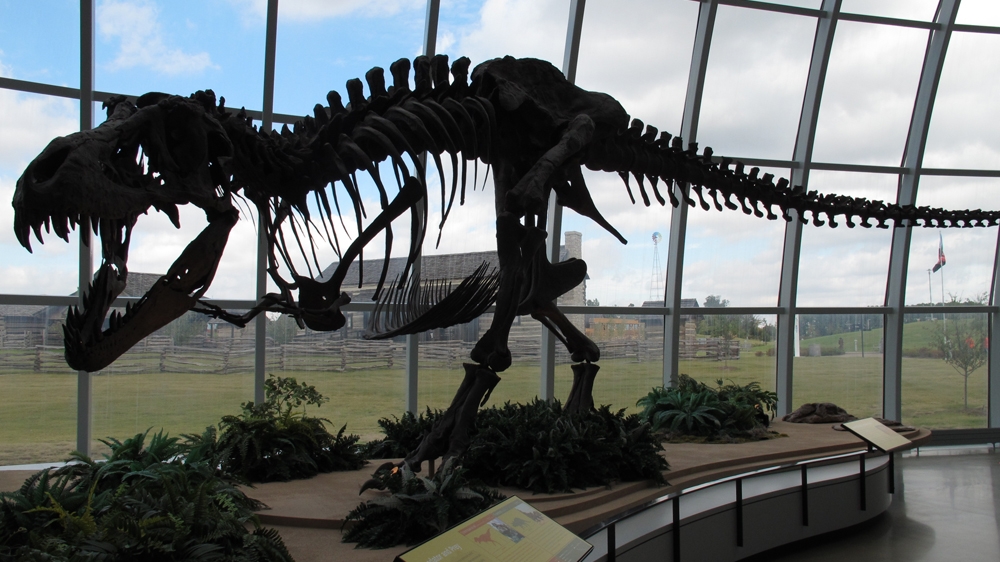
The business of bones
TeckKnow investigates the modern-day Indiana Jones behind the booming business of dinosaur bones.
The business of bones has been booming since 1997 when Chicago’s field museum spent $7.6m on a Tyrannosaurus Rex named Sue. Since then, dinosaurs have become largely coveted darlings of the rich, which has spurred a growing number of fossil or dinosaur hunters.
Does anyone have the right to privately own a dinosaur? Should natural history be bought and sold like fine art?
Keep reading
list of 4 itemsHong Kong’s first monkey virus case – what do we know about the B virus?
Why will low birthrate in Europe trigger ‘Staggering social change’?
The Max Planck Society must end its unconditional support for Israel
The stakes are high, the prices are even higher, so TechKnow decided to travel to London, Los Angeles and Copenhagen to meet auctioneers, museum curators and other scientists to talk about the business of bones and its implications on research and study.
Most museums that have got dinosaurs have more than enough on their plate as it is and not enough manpower to do it.
Summers Place Auctions owner Rupert Van Der Werff and his curator Errol Fuller believe selling fossils is a perfectly legitimate business.
Their rare 150-million-year-old juvenile Allosaurus, which they’ve nicknamed “Little Al,” has created a global buzz and was up for auction during TechKnow‘s visit to West Sussex, England.
It was expected to fetch bids up to $750,000. But one day before the actual bidding, a private collector expressed interest over the telephone to Fuller.
Talking about the buyer, Fuller says: “I think he wants to display it in his house as kind of like a trophy, but I wouldn’t say he’s a trophy hunter.”
While the appeal of privately owning a 150-million-year-old piece of history is understandable, it presents a dilemma for researchers because it limits access to such rare findings.
Putting a dinosaur in a private home “comes at a cost for science,” says Luis Chiappe, lead scientist at the Los Angeles Natural History Museum, “especially one that is rare.”
He oversees one of the largest fossil collections in the United States, and like many of his peers in the science community he believes dinosaurs belong in the museums – and should not be sold at an auction.
Chiappe discovered “Thomas the T-Rex” in southeastern Montana with his team, and everything they dig up ends up in the museum.
“Collectors are after the fossil and not the context in which the fossil was found, and it’s really the context that gives you a lot of critical information,” says Chiappe.
Responding to those sentiments, Fuller says, “grow up, wake up and realise this is the real world.”
“I am kind of against this new priesthood of academics and people that work in museums. I kind of think there has to be a balance, obviously, you want these things to be studied in a proper way, but most museums that have got dinosaurs have got more than enough on their plate as it is and not enough manpower to do it,” Fuller says.
But the museum scientists aren’t the only ones who organise dinosaur excavations.
German palaeontologist Raimund Albersdorfer, who unearthed “Little Al” in the US state of Wyoming, has built a reputation as a dinosaur hunter.
The controversial modern-day Indiana Jones has been accused of fuelling the business of dinosaur bones. But Fuller says Albersdorfer “earns a living by collecting fossils and selling them, but much of what he does ends up in museums – and the museums, to be honest with you, would never get the stuff if it wasn’t for someone like Raimund.”
So, what’s the future of the business of bones?
TechKnow reached out to Raimund Albersdorfer but he declined the invitation after initially agreeing to talk to us.
 |
|
The Tyrannosaurus rex had a lifespan of about 30 years [AP] |